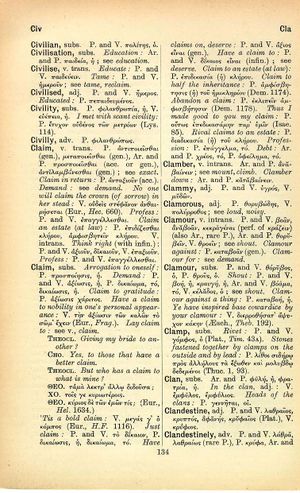clamour: Difference between revisions
From LSJ
ὁ χρόνος ἐστὶ δάνος, τὸ ζῆν πικρός ἐσθ' ὁ δανίσας → time is a loan, and he who lent you life is a hard creditor | time is on loan and life's lender is a prick
(CSV3) |
m (Text replacement - "<b class="b2">Theb.</b>" to "''Theb.''") |
||
| Line 16: | Line 16: | ||
<b class="b2">Clamour against a thing</b>: P. [[καταβοή]], ἡ. | <b class="b2">Clamour against a thing</b>: P. [[καταβοή]], ἡ. | ||
<b class="b2">Ye have inspired base cowardice by your clamour</b>: V. διερροθήσατʼ ἄψυχον κάκην (Aesch., | <b class="b2">Ye have inspired base cowardice by your clamour</b>: V. διερροθήσατʼ ἄψυχον κάκην (Aesch., ''Theb.'' 192). | ||
}} | }} | ||
Revision as of 11:03, 7 August 2017
English > Greek (Woodhouse)
v. intrans.
P. and V. βοᾶν, ἀναβοᾶν, κεκραγέναι (perf. of κράζειν) (also Ar., rare P.), Ar. and P. θορυβεῖν. V. θροεῖν; see shout.
Clamour against: P. καταβοᾶν (gen.).
Clamour for: see demand.
subs.
P. and V. θόρυβος, ὁ, P. θροῦς, ὁ.
Shout: P. and V. βοή, ἡ, κραυγή, ἡ, Ar. and V. βόαμα, τό, V. κέλαδος, ὁ; see shout.
Clamour against a thing: P. καταβοή, ἡ.
Ye have inspired base cowardice by your clamour: V. διερροθήσατʼ ἄψυχον κάκην (Aesch., Theb. 192).

